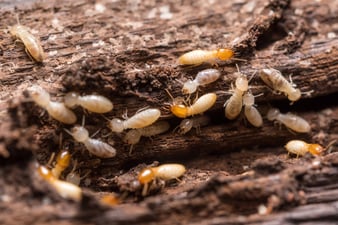Termites are always working. How do they manage to function 24/7? It's all about team work.
So, you know that termites aren’t something you want in your home. You know they are highly efficient wood-destroying machines, eating 24 hours a day, 7 days a week. You know that they live in large colonies, of up to 1 million individuals, but you may not know how a colony functions.
Each individual has a distinct role within the group to make sure their non-stop work gets done and the colony thrives. The termite caste system consists of three levels: Workers, soldiers, and reproductives.
Termite workers are responsible for different tasks depending on age and size. Young workers will typically stay within the colony, taking care of the queen and eggs, repairing the nest and tunnels, and grooming one another and other members of the colony. Older workers take on the responsibility of leaving the nest to forage for food. Subterranean termite workers are relatively small, whitish in color, with no wings or eyes.
Soldier termites’ primary job is to protect the colony. As such, they are typically larger than worker termites, with a hard head and large jaws to help fend off or kill intruders like ants or foreign termites. Soldiers warn the colony of threats by banging their heads against tunnel walls, creating vibrations.
Reproductive termites have one of the most vital jobs in ensuring the survival of the colony. Primary reproductives, the king and queen, are the first to start the colony by mating after leaving the old one, usually during a swarm. Eggs laid by the queen hatch into worker and soldier termites. If the king or queen should die, others in the colony can begin to develop reproductive features to take their place; these are secondary reproductives. At certain times of year, mature colonies will produce a number of winged swarmers. These swarmers will eventually find a mate and lose their wings, leave the nest, and become the king and queen of a new colony.
While the structure of a termite colony is, admittedly, pretty interesting, you still don’t want them making a house out of your home. Call Burgess Pest at the first sign of a termite problem—we don’t just have the fun facts, we have the skills and technology to get rid of them for good.


